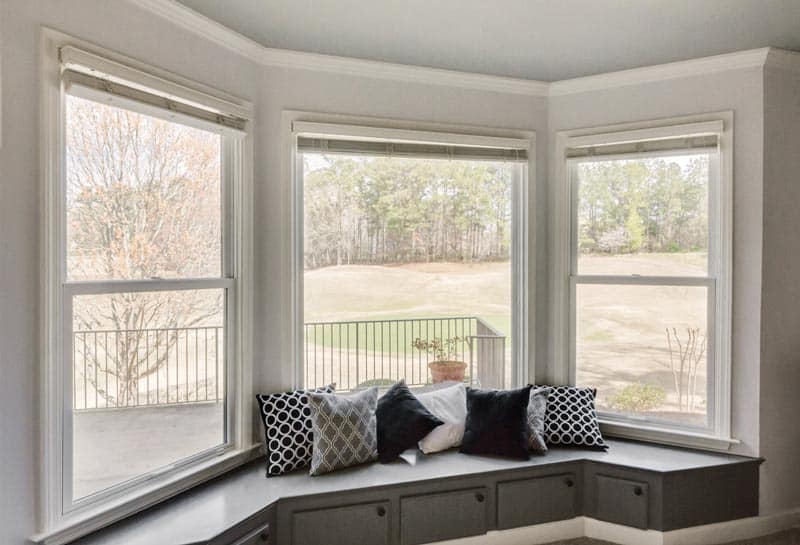Is it time to replace the windows in your home? Casement windows and double-hung windows are some of the more popular window replacement options Home Town Restyling offers. Both styles provide their own unique features and benefits.
If you’re in the market for new or replacement windows, keep reading! In this blog post, we’ll dive into the core differences between casement windows and double-hung windows. We’ll also share pros and cons of each window option, along with some additional considerations for choosing a window contractor.
Casement Windows

Known for their versatility and contemporary look, casement windows are hinged on the side. They open with a crank to a full 90 degrees on the left or right. With casement windows, you don’t have a horizontal rail in the middle of the window to restrict your view like you would with a double hung. This is a benefit for homeowners that want a more simplistic design and modern feel.
Additionally, casement windows offer great ventilation. When opened toward the wind, they funnel in fresh breezes and divert warm indoor air. During the winter months when you want to keep warm air indoors and gain a clearer view, you can remove and store the screen. Casement windows are built to seal tightly, eliminate drafts, and provide comfort in any season.
Casement windows are also easy to clean from inside the home. Gone are the days of climbing a ladder to clean hard-to-reach windows—you simply crank open the window and wipe it down from the inside.
Double-Hung Windows

Double-hung windows are more traditional and often found in older homes. However, they’re still the most common windows on the market. With two sashes that work in tandem, double-hung windows move up and down in their frame. Single-hung is an additional option that only has an operable bottom sash.
If you have children or pets at home, double-hung windows offer greater security. You can open the top sash for ventilation while keeping the lower part of the window closed. Like casement windows, newer models of double-hung windows also have a tiltable frame for easy cleaning inside the home.
Now that you understand the basic differences between casement windows and double-hung windows, here’s a quick recap of the pros and cons.
Pros of Casement Windows
- Can modernize your home or complement your current style
- Provide unobstructed views
- Require less service and maintenance
- Maximize air ventilation, which can be ideal during the hot summer months
- Easy to clean from inside the home
Cons of Casement Windows
- Often more expensive than double-hung windows
- Unable to accommodate window air conditioners
Pros of Double-Hung Windows
- Often less expensive than casement windows
- Provide greater security for families with children or pets
- Can accommodate window air conditioners
- Many newer styles can be cleaned easily from the inside
Cons of Double-Hung Windows
- Screen is on the outside of the window
- Less ventilation than a casement window
- Horizontal rail can restrict view of the outdoors
What to Consider When Buying Replacement Windows

Many homeowners take a like-for-like approach to replacing their windows. If their home already has double-hung windows, they purchase double-hung windows to replace them. However, some homeowners are dissatisfied with their current style of windows because it no longer fits their needs.
You’ll want to start by considering functionality. Are you looking for a window with good ventilation for hot Iowa summers? Do you want a screen you can easily remove and store? Do you have young children or pets that enjoy spending time near the window?
Location is also an important factor. If you have a window over your kitchen sink or in a similar area where you have to reach to open the window, a casement window with a crank might be a better fit. However, window openings will add costs to your window replacement project, so you’ll want to be sure to factor this into your budget.
No matter which option you choose, be sure to ask your window contractor whether your new windows will be in compliance with building codes. Many cities have residential egress requirements that help ensure firefighters in full gear can fit through the window. Remember, your home was built to include a specific number and type of windows.
Choosing a Replacement Window Contractor

Here are some important questions you’ll want to ask before you decide on a window company:
Are they local?
Local window companies have deeper ties to their community. When you have questions or need support, it’s often easier to get in touch, especially if they have an in-house service department. Many local companies will also have a showroom where you can see select products on display.
What warranties do they offer?
Window companies that stand behind their products and workmanship offer clear warranties. This often includes a manufacturer’s warranty and a workmanship warranty. For example, at Home Town Restyling, we offer a lifetime warranty on workmanship in addition to the manufacturer’s warranty.
How is the service?
If your phone calls go unanswered for days and you find yourself having to constantly follow up, this is a major red flag.
Is labor performed by employees or subcontractors?
Many window companies subcontract their work. In doing this, they have little control over the quality of the installation. This is why we only staff our projects with the highest quality craftsman who wear the Home Town Restyling name.
How long have they been in business?
When you work with a company that’s been in business as long as we have—more than three decades—you’ll immediately notice a difference. We know how to keep our customers happy and deliver high-quality work that lasts.
Do they offer financing?
Replacing your home’s windows is an investment. Some window companies will offer financing to help make it more affordable.
Ready to Replace Your Old Windows?
Reach out to Home Town Restyling today for a free quote!

